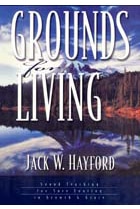Chapter 1: The Holy Scriptures: The Fountainhead of Truth
The Bible Is Antiquity’s Most Trustworthy Document
Knowing that the Bible is accurate and trustworthy is an essential and logical starting point for any thinking person – all the more so considering that we are affirming it as the foundational guiding document for our lives. But, how do we know that it is what it claims to be?
People will regularly raise questions about the trustworthiness of the Bible, simply because it is an ancient book. They argue that the Bible has been re-translated and copied so many times, that one can’t be confident that the version we have today is the same as the original Scriptures. They sometimes propose a “lack of reliability: of the ancient manuscripts that form the basis for all modern translations of the Bible.
However, those who are committed enough to study, and to seek to verify them, can go back to the literary resources from which our modern Bibles originate, and they will discover the undeniable fact: what we read in our Bibles today is what was originally written. Volumes exist which explain the research and findings of scholars regarding the Bible’s trustworthiness, but for our purpose in this one, we must on focus just a few of their findings.
The accuracy of the Bible is:
…Evidenced by the number of existent manuscripts.
Many of the most well known works of antiquity, such as the writings of Plato and Aristotle, are known from only 25-40 manuscripts – that is, 25-40 copies of their writings made by others and dating to within a few hundred years of the author’s writing, but not the original writings of the men themselves.
In contrast, there are more than 6,000 manuscripts or parts of the New Testament, many from within the first two centuries A.D., that are available for us to compare. This large number, from scattered locations, from early yet varied dates, provides a base for comparison that would give every reason to expect a high degree of variance between manuscripts. Yet notably, although not surprisingly if the Bible really is the Word of God, there is an incredibly high level of consistency and continuity between them.
…Evidenced in the reliability of the text.
Because of the fact that manuscripts were hand-copied, one might well assume that errors and mistakes could easily creep in. the Iliad by Homer, for instance, contains 15,600 lines of which literary scholars question the accuracy of 746 lines (due to errors or omissions).
According to literary scholars (and it is important to stress here that these are not necessarily Christian believers, but people pursing the New Testament solely as an historical Greek manuscript) there are 20,000 lines, only 40 lines of which have given the most critical eye any reason to question their accuracy. Even more profoundly, and significant to every believer in the Bible, even among those few contested “lines,” not one relates to a major doctrinal issue.
…Evidenced by the discovery of the Dead Sea Scrolls.
Before the Dead Sea Scrolls were discovered, the oldest Old Testament manuscripts dated to the tenth century A.D. (known as the Masoretic text). Given that the book of Malachi is estimated to have been written around the fourth century before Christ, and the Masoretic text is dated around the tenth century after Christ, there existed a hiatus of about 1,400 years between the time of the last writer of the OT and the oldest existing copy of the Hebrew Scriptures.
Then came the discover of the Dead Sea Scrolls in 1948! This find has been categorically described as the greatest archeological discovery of the entire 20th Century. Significant for us is that, for example, a scroll of the complete text of the Book of Isaiah was found – a copy dated to 125 B.C., almost 1,000 years earlier than the Masoretic text. With a millennium having transpired between the two, scholars expected to find that many changes and mistakes had been introduced into the Masoretic text when comparing them to the Scrolls. But they found almost none – the integrity of the text was remarkably well preserved, a full thousand years’ passage giving evidence for our believing the Bible we have in hand today is indeed what was written long ago.
…Evidenced by the testimony of scholars.
Frederick Kenyon, a leading authority in the field of New Testament textual criticism, said, “One word of warning already referred to must be emphasized in conclusion: no fundamental doctrine of Christian faith rests on any disputed reading in any of the manuscripts. Constant references to mistakes and divergences of readings, such as the plan of this book necessitates, might give rise to the doubt whether the substances, as well as the language of the Bible, is not open to question. It cannot be too strongly asserted that in substance, the text of the Bible is certain.
Especially is this the case with the New Testament. The number of manuscripts of the New Testament, of early translations from it, of quotations from it in the oldest writers of the Church, is so large that it is practically certain that the true reading of every doubtful passage is preserved in some one or other of these ancient authorities. This can be said of no other ancient book in the world. Scholars are satisfied they possess substantially the true text of the principal Greek and Roman writers whose works have come down to us: of Sophocles, of Thucydides, of Cicero, of Virgil, yet our knowledge of their writings depends on a mere handful of manuscripts, whereas the manuscripts of the New Testament are counted by hundreds and even thousands.”
We can therefore say with certainty, that when we come to the Scriptures, we rightly trust in their accuracy. Further evidence also exists within the broader field of Middle Eastern archeology, but suffice to say regarding the literary text of the Bible alone – in it, we come to a book not only given by God’s Holy Spirit, but also sovereignly protected by Him through the centuries.
From Grounds For Living: Solid Foundations for Sure Footing in Growth and Grace Copyright © 2001 Jack W. Hayford. Reprinted by permission from Sovereign World Ltd., Kent, England. All rights reserved.
Further Your Study
Our gift of this article by Pastor Jack Hayford is made possible by your gracious support of the ministry. Partner with us online or call toll-free (800) 776-8180 to donate. (Outside the U.S., call (818) 779-8525).
Order Now


